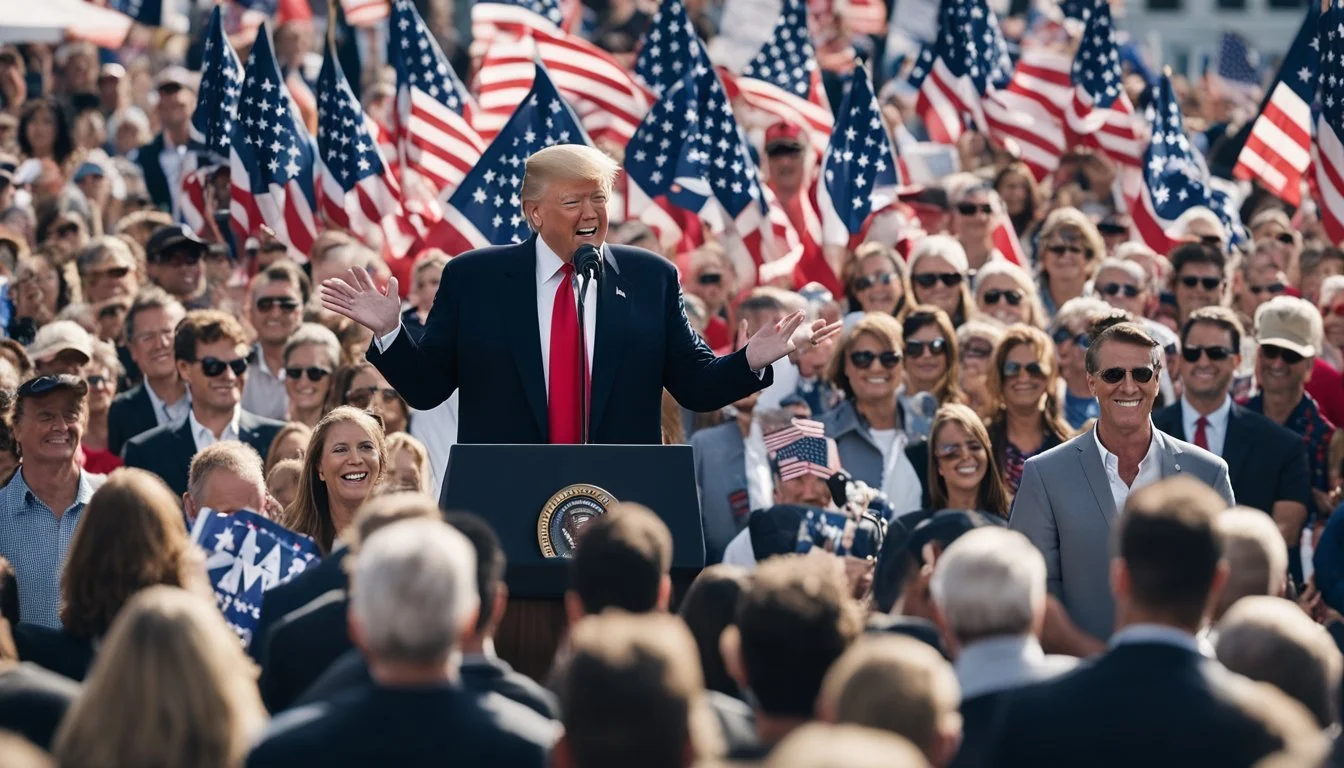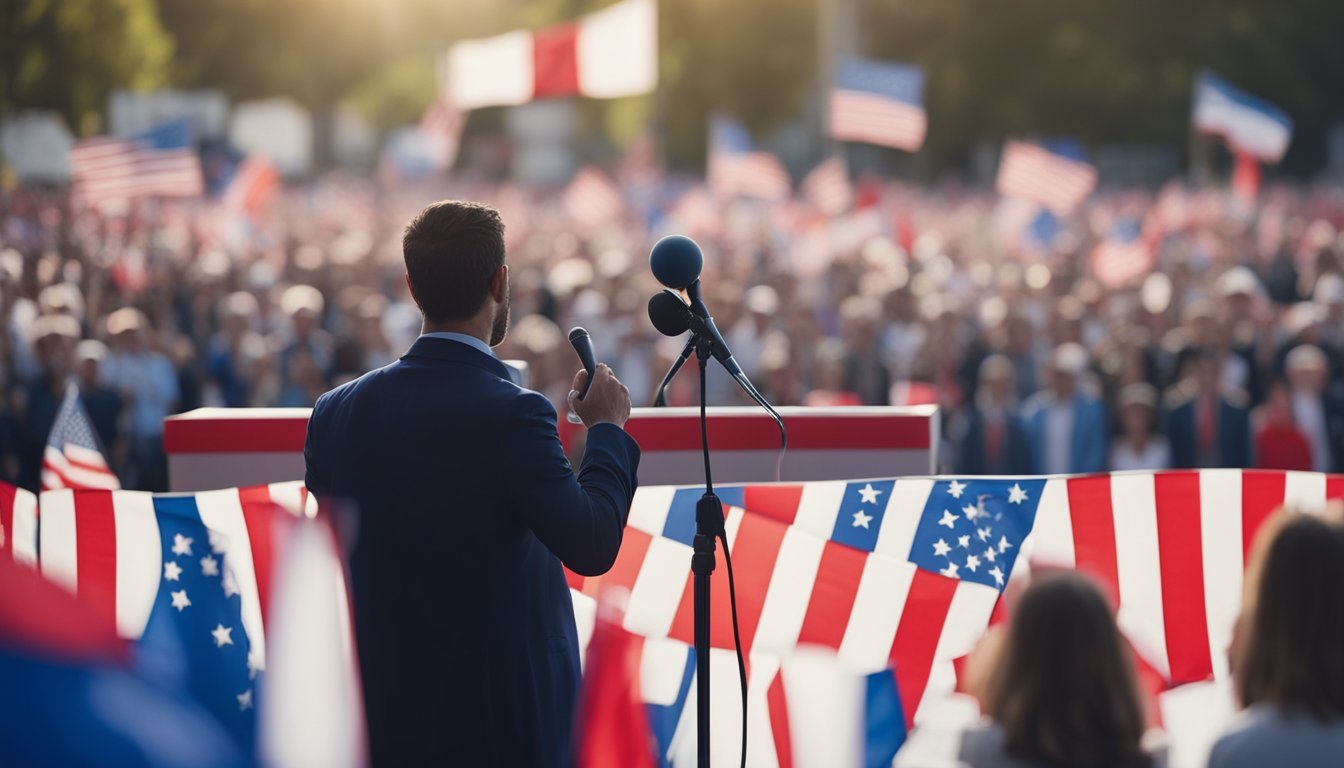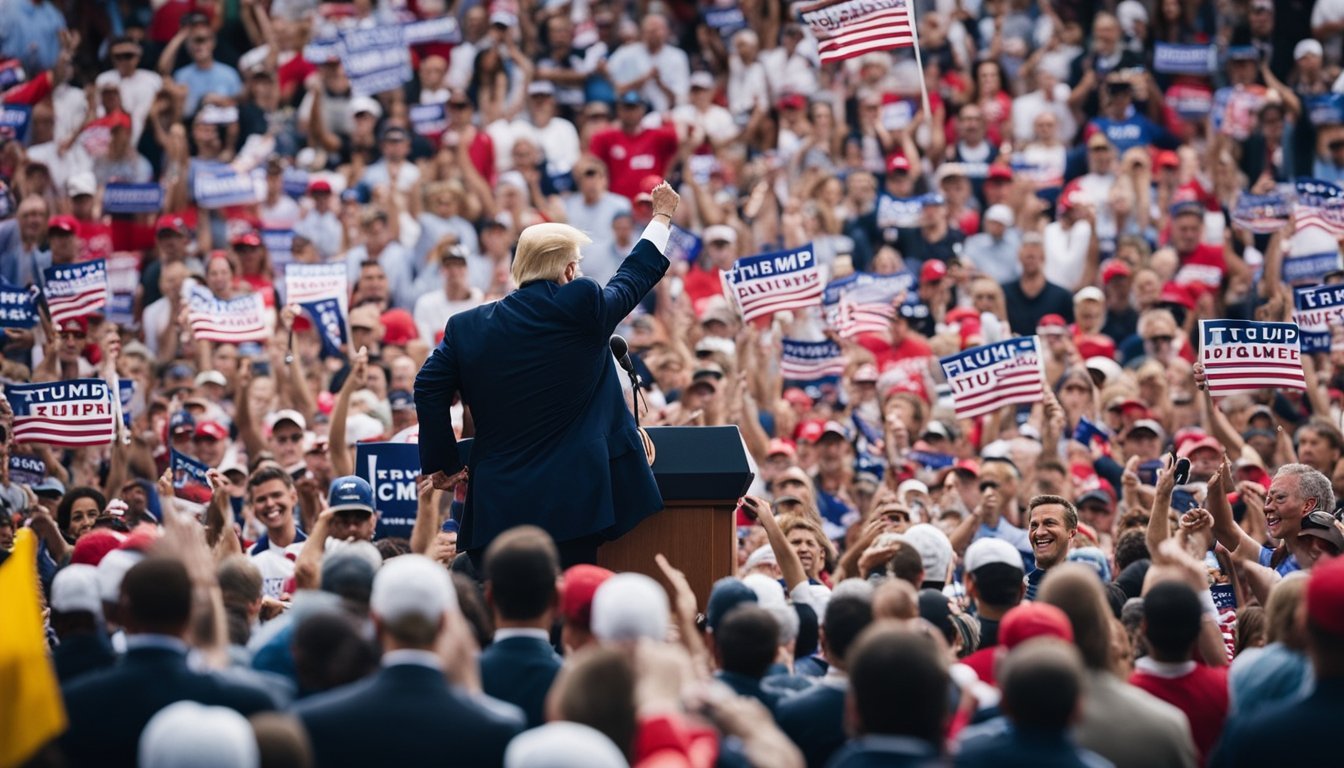Donald Trump Launches Controversial Presidential Bid in 2015
The Emergence of an Unconventional Presidential Candidate
2015 marked a pivotal year in American politics as Donald Trump launched his presidential campaign. On June 16, Trump descended the escalator at Trump Tower in New York City to announce his bid for the Republican nomination. His bombastic style and controversial statements immediately set him apart from other candidates.
Trump's unorthodox campaign defied conventional political wisdom, gaining momentum despite - or perhaps because of - his provocative remarks. He dominated media coverage and rose in the polls, tapping into voter frustration with the political establishment. His promise to "Make America Great Again" resonated with many Republican voters.
Throughout 2015, Trump's campaign was defined by headline-grabbing statements on immigration, trade, and foreign policy. While fact-checkers frequently disputed the accuracy of his claims, Trump's popularity among Republican voters continued to grow. By the end of the year, he had established himself as a frontrunner for the nomination, setting the stage for the tumultuous election year to come.
Rise in Politics
Donald Trump's entry into the 2016 presidential race marked a dramatic shift in American politics. His unconventional campaign style and controversial statements quickly propelled him to the forefront of the Republican field.
Announcement of Candidacy
On June 16, 2015, Donald Trump descended the escalator at Trump Tower in New York City to announce his candidacy for president. His speech immediately drew attention for its provocative tone and content.
Trump positioned himself as a political outsider, promising to "Make America Great Again." He highlighted issues like immigration, trade, and national security as key campaign priorities.
His announcement garnered significant media coverage, though many political analysts initially dismissed his chances of success. Trump's celebrity status and blunt speaking style set him apart from traditional politicians.
Political Background
Prior to 2015, Trump had no experience holding public office. He was primarily known as a real estate developer and reality TV star from "The Apprentice" series.
Trump had previously flirted with presidential runs, including a brief campaign for the Reform Party nomination in 2000. He also gained political attention by questioning President Obama's birthplace.
In the years leading up to 2015, Trump increased his political involvement. He spoke at conservative events and donated to various candidates from both major parties.
Republican Field
The 2016 Republican primary field was exceptionally crowded, with 17 major candidates vying for the nomination. Experienced politicians like Jeb Bush and Marco Rubio were initially seen as frontrunners.
Trump's entry disrupted traditional campaign dynamics. His provocative statements and unorthodox style dominated media coverage, often overshadowing other candidates.
Despite frequent controversies, Trump's poll numbers steadily rose throughout 2015. His anti-establishment message resonated with many Republican voters frustrated with traditional politicians.
By the end of 2015, Trump had established himself as a leading contender for the Republican nomination, defying early predictions of his campaign's demise.
Campaign Strategies
Donald Trump's 2015 campaign employed distinctive strategies that reshaped political norms. His approach leveraged media platforms, crafted a unique public image, and utilized unconventional rhetoric to stand out in a crowded field.
Media Utilization
Trump maximized his media presence through strategic use of television and social media. He frequently appeared on news programs, giving interviews and calling in to shows. This constant visibility kept him in the public eye at minimal cost to his campaign.
Twitter became a key tool for Trump. He used the platform to bypass traditional media filters and communicate directly with supporters. His tweets often drove news cycles and sparked controversies that garnered free media attention.
Trump's reality TV background informed his campaign style. He treated rallies like entertainment events, drawing large crowds and media coverage. This approach helped him dominate airtime compared to other candidates.
Public Perception
Trump cultivated an outsider image that resonated with many voters. He positioned himself as a successful businessman who could "drain the swamp" in Washington. This persona appealed to those frustrated with career politicians.
His brash, unapologetic style set him apart from traditional candidates. Trump's willingness to speak bluntly on controversial topics garnered both criticism and admiration. This polarizing approach energized his base while alienating others.
The "Make America Great Again" slogan encapsulated Trump's campaign message. It tapped into nostalgia and a desire for change, becoming a powerful brand for his campaign.
Political Rhetoric
Trump's speeches and debate performances were marked by simple, direct language. He favored short, punchy statements over complex policy discussions. This style made his message accessible to a wide audience.
He frequently used repetition and catchy phrases to reinforce key points. Nicknames for opponents, like "Crooked Hillary," became part of his regular vocabulary. These tactics made his message memorable and quotable.
Trump's rhetoric often pushed boundaries of political discourse. He made provocative statements on immigration, trade, and other issues. While controversial, this approach kept him at the center of political discussions.
Public Engagements
Donald Trump's 2015 campaign was marked by numerous public appearances that drew large crowds and significant media attention. His events often sparked strong reactions, both positive and negative, from attendees and observers.
Rallies and Public Speeches
Trump held frequent rallies across the country, attracting thousands of supporters. His speeches were characterized by bombastic rhetoric and provocative statements. He often targeted immigrants, political opponents, and the media. Many criticized his language as racist and misogynistic.
Trump's rallies sometimes turned chaotic. In August, he drew 30,000 people to a stadium in Alabama. At a Vermont event, he ordered security to confiscate coats from protesters in freezing weather. His events became known for chants like "Build the wall!" and "Lock her up!"
Despite controversy, Trump's rallies energized his base. Supporters praised his blunt style and outsider status. Critics accused him of stoking fear and anger among voters.
Voter Interaction
Trump engaged with voters through various means beyond rallies. He used social media, particularly Twitter, to communicate directly with supporters and critics alike. His tweets often made headlines and drove news cycles.
He conducted impromptu press conferences and gave interviews to local media at campaign stops. Trump also made appearances at state fairs, diners, and other local venues to meet voters face-to-face.
These interactions allowed Trump to present himself as accessible and in touch with average Americans. However, some encounters led to confrontations with protesters or challenging questions from voters.
Debates and Interviews
Trump participated in several Republican primary debates in 2015. His performances were marked by clashes with moderators and fellow candidates. He often dominated speaking time and made memorable quips that garnered media attention.
In a Fox News debate, Trump sparred with moderator Megyn Kelly over his comments about women. This exchange led to an ongoing feud with the network. During a CNBC debate, he criticized the moderators for asking "unfair" questions.
Trump gave numerous interviews to major news outlets throughout 2015. These often became combative, with Trump pushing back against tough questions. He frequently called in to morning shows, giving him a platform to address current events and campaign issues.
Policy Proposals
Donald Trump's 2015 campaign centered around bold policy ideas that resonated with many voters. He put forth ambitious plans focused on immigration, the economy, and America's role on the world stage.
Immigration Reform
Trump made immigration a cornerstone of his campaign. He proposed building a wall along the U.S.-Mexico border, arguing it would curb illegal immigration. Trump insisted Mexico would pay for the wall's construction.
He called for ending birthright citizenship and implementing a nationwide E-Verify system. Trump advocated for deporting all undocumented immigrants and temporarily banning Muslims from entering the U.S.
His hard-line stance on immigration energized his base but drew sharp criticism from opponents. Trump framed these policies as necessary for national security and protecting American jobs.
Economic Plans
Trump promised to revitalize the U.S. economy through tax cuts and deregulation. He proposed reducing the corporate tax rate from 35% to 15% to spur job creation and economic growth.
For individuals, Trump outlined a simplified tax code with four brackets topping out at 25%. He pledged to eliminate the estate tax and alternative minimum tax.
Trump vowed to renegotiate trade deals like NAFTA, arguing they hurt American workers. He proposed imposing tariffs on imports from countries like China to protect U.S. manufacturing.
His economic plans aimed to boost GDP growth to 4% annually and create 25 million new jobs over a decade.
Foreign Policy
Trump campaigned on an "America First" foreign policy approach. He criticized U.S. involvement in conflicts abroad, particularly in the Middle East.
Regarding Syria, Trump argued for letting Russia take the lead in combating ISIS. He proposed increasing military spending while reducing U.S. commitments overseas.
Trump took a tough stance on China, accusing it of currency manipulation and unfair trade practices. He pledged to label China a currency manipulator and impose tariffs on Chinese imports.
He also vowed to defeat ISIS rapidly, promising to "bomb the hell out of them" and take their oil. Trump's foreign policy ideas marked a sharp departure from traditional Republican positions.
Controversial Statements
Donald Trump made numerous provocative remarks during his 2015 presidential campaign that sparked intense debate and media coverage. His comments on immigration, religion, race, and personal attacks against rivals and critics generated significant controversy.
Immigration Comments
Trump's campaign launch speech included inflammatory statements about Mexican immigrants. He claimed Mexico was "sending" criminals, drug dealers, and "rapists" to the United States. These remarks drew sharp criticism from immigrant rights groups and the Mexican government.
Trump also proposed building a wall along the U.S.-Mexico border and having Mexico pay for it. He called for a "total and complete shutdown" of Muslims entering the United States until the country's representatives could "figure out what is going on."
Religious and Racial Remarks
Trump suggested creating a database to track Muslims in the U.S. He falsely claimed to have seen "thousands and thousands" of Muslims in New Jersey cheering as the World Trade Center collapsed on 9/11.
He retweeted inaccurate crime statistics that falsely inflated the rate of Black-on-White homicides. Trump initially hesitated to disavow support from former Ku Klux Klan leader David Duke.
Personal Attacks
Trump mocked Senator John McCain's military service, saying: "He's not a war hero. He's a war hero because he was captured. I like people that weren't captured."
He criticized Fox News host Megyn Kelly after a debate, saying she had "blood coming out of her wherever." Trump also made derogatory comments about Rosie O'Donnell's appearance.
He appeared to mock a disabled New York Times reporter by imitating his physical condition during a campaign rally. Trump denied this characterization of his actions.
Political Influence and Public Response
Donald Trump's 2015 presidential campaign had a significant impact on American politics. His unconventional approach reshaped the Republican Party landscape and sparked intense public reactions across the nation.
Impact on Republican Party
Trump's candidacy upended traditional Republican politics. His brash style and outsider status attracted voters dissatisfied with establishment figures. This forced other GOP candidates like Jeb Bush and Scott Walker to adjust their strategies.
Trump's policy proposals on immigration and trade diverged from typical Republican positions. His call for a border wall and criticism of free trade deals resonated with many conservative voters. This shift challenged long-held party orthodoxies.
The businessman's dominance in debates and media coverage overshadowed rivals. His confrontational tactics and memorable soundbites left other candidates struggling for attention. This disrupted normal primary dynamics and fundraising patterns.
National Polls and Voter Support
Trump quickly rose to the top of national polls after entering the race. His support grew steadily throughout 2015, defying predictions of a temporary surge. By year's end, he consistently led the Republican field.
Key voter groups fueling Trump's rise included blue-collar workers and those without college degrees. His "Make America Great Again" slogan connected with voters feeling left behind economically. Trump's celebrity status and outsider image also attracted those frustrated with career politicians.
Despite controversial statements, Trump's poll numbers remained resilient. Remarks on immigration and Muslims drew criticism but didn't dent his support. This pattern challenged conventional political wisdom about campaign gaffes.
Public Support and Criticism
Trump's campaign generated passionate reactions from supporters and critics alike. His rallies drew large, enthusiastic crowds across the country. Supporters praised his straight talk and business background.
Critics accused Trump of promoting divisive rhetoric and unrealistic promises. His comments on women, minorities, and immigrants sparked protests. Some Republican leaders publicly distanced themselves from the candidate.
Media coverage of Trump was extensive and polarized. Some outlets were criticized for giving him disproportionate airtime. Fact-checkers noted frequent inaccuracies in Trump's statements, but this didn't seem to affect his popularity.
Personal and Business Profile
Donald Trump's prominent business career and personal brand were defining aspects of his public persona in 2015. His vast real estate empire, luxury properties, and high-profile ventures shaped his image as a wealthy tycoon and celebrity businessman.
Wealth and Business Ventures
Trump's net worth in 2015 was a subject of debate and scrutiny. He claimed a fortune of over $10 billion, though other estimates placed it lower. His business empire spanned real estate, golf courses, hotels, and entertainment.
The Trump Organization, his primary company, owned or operated numerous properties globally. Notable assets included Trump International Hotel in Las Vegas, Trump National Doral golf resort in Miami, and his Mar-a-Lago estate in Florida.
Trump's television career, particularly as host of "The Apprentice," significantly boosted his wealth and fame. He also earned income from book deals, speaking engagements, and licensing his name to various products and properties.
Personal Branding
Trump's personal brand was a crucial element of his business strategy. He cultivated an image of success, luxury, and boldness through his properties, media appearances, and social media presence.
His signature hairstyle, bold personality, and catchphrases like "You're fired!" became instantly recognizable. Trump's branding extended to consumer products, including fragrances, clothing, and even steaks.
He leveraged his celebrity status to promote his businesses and expand his influence. His active Twitter presence helped maintain his public profile and allowed direct communication with supporters and critics alike.
Trump Tower and Real Estate
Trump Tower, completed in 1983, stood as the crown jewel of Trump's real estate portfolio in 2015. The 58-story skyscraper on Fifth Avenue in New York City housed Trump's penthouse residence and The Trump Organization's headquarters.
His real estate holdings included commercial properties, luxury condominiums, and golf resorts across the United States and internationally. Trump's development projects often featured his name prominently, reinforcing his brand.
He also licensed his name to properties he didn't own, capitalizing on the perceived value of the Trump brand in real estate. This strategy allowed for expansion without significant capital investment.
Comparisons and Historical Context
Donald Trump's 2015 presidential campaign drew both parallels and contrasts to controversial figures and campaigns from American political history. His populist rhetoric and outsider status evoked memories of past political mavericks, while his unconventional approach set new precedents in modern campaigning.
Previous Controversial Figures
Trump's brash style and populist message invited comparisons to historical figures like Huey Long and George Wallace. Long, the former Louisiana governor, gained a national following in the 1930s with his "Share Our Wealth" program and fiery speeches against elites. Wallace, known for his segregationist views, ran for president multiple times on an anti-establishment platform.
Joseph McCarthy's anti-communist crusade of the 1950s shared some rhetorical similarities with Trump's tough stance on immigration and national security. Both men skillfully used media attention to amplify their messages and stir public emotions.
Historical Campaign Comparisons
Trump's 2015 campaign broke from traditional political norms in ways that set it apart from historical precedents. His extensive use of social media, particularly Twitter, to communicate directly with supporters was unprecedented in American politics.
The campaign's reliance on large rallies and provocative statements to generate free media coverage echoed tactics used by populist candidates of the past, but on a much larger scale. Trump's willingness to attack fellow Republicans and the media recalled the combative style of figures like Teddy Roosevelt.
Unlike most previous outsider candidates, Trump's celebrity status and personal wealth allowed him to gain instant national recognition and fund his campaign without traditional party support.







